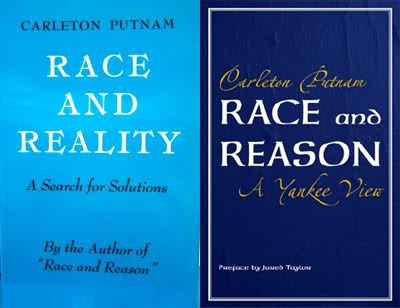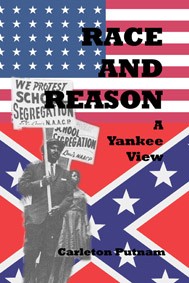[right]AUDIOS[/right]

[justify]Race and Reason - A Yankee View was first published in 1961. In this book Carleton Putnam strikes at the root of the race matter. He thoroughly explores the ideology which led to the Supreme Court's decision in desegregation cases and traces it to its source. In the process he puts race against the background of fundamental American ideals with arresting results. He presents documented facts, and discloses a situation which should be brought to the attention of the American people.
Race and Reality is a sequel to Carleton Putnam's book Race and Reason, which sold over 200,000 copies since its publication in 1961. Race and Reality brings up-to-date the story begun in the earlier volume. Readers familiar with the latter will find summarized here Putnam's essential viewpoint set in a fresh perspective. They will also find added documentation and much that throws new light on the world's deepening racial crisis.[/justify]
[center]Carleton Putnam - Race and Reality.pdf (476.07 KB)
[large]http://www.balderexlibris.com/index.php?post/Putnam-Carleton-Race-and-Reality[/large]
Carleton Putnam - Race and Reason.pdf (382.85 KB)
[large]http://www.balderexlibris.com/index.php?post/Putnam-Carleton-Race-and-Reason[/large][/center]
[---]
[center][large]Race and Reason
A YANKEE VIEW[/large]
By Carleton Putnam[/center]
Copyright, 1961, by Public Affairs Press
419 New Jersey Avenue, S.E., Washington 8, D. C.
Printed in the United States of America
Library of Congress Catalog Card No. 61-8447
[center][large]FOREWORD[/large][/center]
 [justify]This book is a signal contribution to an understanding of the race controversy. No other writer, in my opinion, has yet combined so forceful an analysis of the viewpoints of both North and South with so clear a grasp of the reasons behind each.
[justify]This book is a signal contribution to an understanding of the race controversy. No other writer, in my opinion, has yet combined so forceful an analysis of the viewpoints of both North and South with so clear a grasp of the reasons behind each.Carleton Putnam strikes at the root of the matter. He thoroughly explores the ideology which led to the Supreme Court?s decision in the desegregation cases and traces it to its source. In the process he puts race against the background of fundamental American ideals with arresting results. He presents documented facts, and discloses a situation, which I believe should be brought to the immediate attention of the American people. Race and Reason may well become a text for the unorganized majority in their battle against the social concepts of our minority groups.
If there be an argument in favor of integration which is not plainly set out in this volume, and as plainly examined, I have not heard it. The writing is incisive and can be read by the layman at one sitting with pleasure as well as profit. The author has thought through many issues, and has combined his thinking with careful research. He gives his results in telling sentences, crisp and spare. In these pages, any legislator, judge, lawyer, minister or college debater can have at his finger tips, conveniently indexed, a succinct reply to every sophistry advanced by the propagandist. To those who recognize that the salvation of the South lies in the education of public opinion rather than in rear-guard court actions, and that our national leaders must be told the scientific as well as the political facts of race, this book will be indispensable.
My personal enthusiasm has been increased by knowing Putnam himself. He is a dyed-in-the-wool Northerner, a New Englander collaterally descended from both Israel Putnam, George Washington?s first major-general, and Rufus Putnam, founder of the Ohio Colony. Putnam is a Yankee in the true sense of the word. He speaks with detachment and from what I may term the native American outlook. Few men are better qualified by inheritance and training to recall us to the principles on which our republic rests.
In his own career Putnam has been singularly successful both as a practical man of affairs and as a scholar. Graduating with a science degree and with honors in history and politics from Princeton, and with a law degree from Columbia, he was for fifteen years president of Chicago and Southern Air Lines and later chairman of the board of Delta Air Lines. He finally retired, in his early fifties, to write biography, and has already distinguished himself in this field. My fellow journalist, Virginius Dabney, aptly described the situation when he said editorially that the first volume of Putnam?s Theodore Roosevelt ?had the critics turning handsprings.?
Putnam writes from a knowledge of history, science and law. He writes from nation-wide experience in business, and from long residence in North and South. He knows America, its past and its present. I consider his message imperative reading for its own sake, and doubly valuable because of the man who speaks.
I would like finally to comment upon the panel of scientists who have signed the Introduction which follows this Foreword. Their tribute is, I believe, unique. I know of no other case where a social study of this kind has had such combined support from the fields of genetics, psychology, anthropology, zoology and anatomy.
The panel is headed by R. Ruggles Gates, generally acknowledged to be one of the world?s leading human geneticists. Born a Canadian, Dr. Gates received his MA. from Mt. Allison, his B.Sc. from McGill, his Ph.D. from Chicago and his D.Sc. from the University of London. He has been a Fellow of the Royal Society since 1931.
His active career began as a Lecturer in Biology at St. Thomas?s Hospital in London, continued as Associate Professor of Zoology at the University of California, then as Professor of Botany at King?s College, University of London, and as Honorary Research Fellow in Biology at Harvard. For the last eight years he has been engaged in world travel for the study of Races and Race Crossings. His publications include The Mutation Factor in Human Evolution (1915), Human Genetics, 2 Vols. (1946), Human Ancestry (1948), and Pedigrees of Negro Families (1949).
From the field of psychology we find Henry E. Garrett, Professor Emeritus, Columbia University. For fifteen years Dr. Garrett headed the Department of Psychology at Columbia. He has been President of the Eastern Psychological Association and the American Psychological Association. In addition he has served as Vice Chairman of the Division of Psychology and Anthropology of the National Research Council. He is general editor of the American Psychological Series, and is the author of Statistics in Psychology and Education; Great Experiments in Psychology; Psychological Tests, Methods and Results; Psychology; General Psychology; and Testing.
Robert Gayre is a Scot. Presently Editor of the Mankind Quarterly, he was formerly Professor of Anthropology and head of the postgraduate Department of Anthropo-Geography, University of Saugor, India. He is the author of Teuton and Slav (1944) and of
Race and Reason 2
Ethnology, 3 Vols. (soon to be published).
He was Director of Education in the Allied Control Commission for Italy after World War II.
Wesley C. George began his career as Instructor in Zoology at the University of North Carolina, served variously as Professor of Biology at Guilford College, Adjunct Professor of Zoology at the University of Georgia, and Associate Professor of Histology and Embryology at the University of Tennessee Medical School. He has been Professor of Anatomy at the University of North Carolina since 1924 and was for ten years head of the department there. He is the author of numerous articles on the development of man and other vertebrates, comparative hematology and the philosophy of science.
There can be no doubt that the endorsement of these men, taken together with the evidence of other scientists called as witnesses by the author in his text, guarantee the scientific integrity of Race and Reason and confirm the soundness of its premises.
T. R. Waring Editor, Charleston News and Courier[/justify]
[center][large]INTRODUCTION[/large][/center]
[justify]Biological scientists seldom find themselves writing an introduction to what is essentially a study of a social problem. However, the problem in this instance is of such great importance from both the scientific and social standpoints, and the two are so closely interrelated, that we cannot dissociate ourselves from the task.
Our professional interest lies in the scientific foundations on which Mr. Putnam rests his thesis. We are in complete accord with what he has to say concerning these foundations. We agree with his balanced presentation of genetic and environmental factors in the area of both racial and individual biology. We believe they deserve this sharp reappraisal in the light of current problems in the world at large. We can also confirm Putnam?s estimate of the extent to which non-scientific, ideological pressures have harassed scientists in the last thirty years, often resulting in the suppression or distortion of truth.
The intrusion of political thought into the social and anthropological sciences which has occurred on a massive scale during this period, has been a very great disservice to scientific investigation and to the guidance which scientific work and its conclusions ought to be able to render to human society. Man must be guided by science, but scientific thought must not be moulded to preconceived political ideas.
We, as signatories to this introduction, although we may differ over some aspects of genetic, biological, anthropological and sociological theory, believe that statesmen and judges today frequently take positions based upon an inadequate knowledge of the facts so far as they relate to the nature of man. Therefore, we have no hesitation in placing on record our disapproval of what has been all too commonly a trend since 1930. We do not believe that there is anything to be drawn from the sciences in which we work which supports the view that all races of men, all types of men, or all ethnic groups are equal and alike, or likely to become equal or alike, in anything approaching the foreseeable future. We believe on the contrary that there are vast areas of difference within mankind not only in physical appearance, but in such matters as adaptability to varying environments, and in deep psychological and emotional qualities, as well as in mental ability and capacity for development. We are of the opinion that in ignoring these depths of difference modern man and his political representatives are likely to find themselves in serious difficulties sooner or later.
Whatever may be said for or against minor or detailed points made by the author of this book, we feel that it deserves the serious attention of both scientists and public men wherever racial problems exist. The facts in it cannot much longer be ignored. It probes to the core of an abscess, yet does so with a healing touch. There is logic and common sense in these pages; there is also inescapable scientific validity.[/justify]
[right][small]R. Ruggles Gates, M.A., Ph.D., D.Sc., LL.D., F.R.S.
Henry E. Garrett, Ph.D., D.Sc.
R. Gayer Of Gayer, M.A., D.Phil., D.Pol.Sc., D.Sc.
Wesley C. George, MA., Ph.D.[/small][/right]